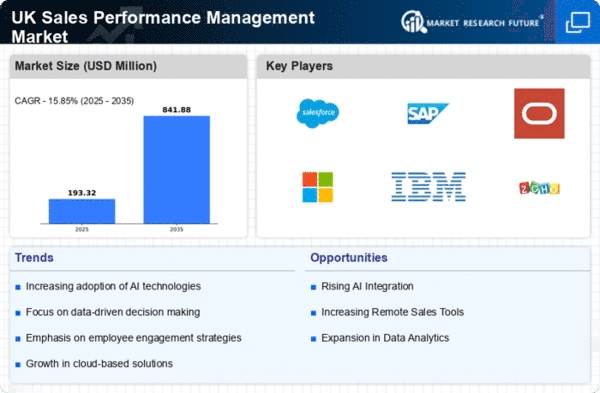Integration of Advanced Analytics
The integration of advanced analytics into sales performance-management systems is becoming a critical driver in the UK market. Businesses are increasingly seeking solutions that provide predictive analytics and real-time insights to enhance decision-making processes. Approximately 60% of UK firms are now adopting advanced analytics tools to optimise their sales strategies. This trend suggests that organisations are recognising the value of data in forecasting sales trends and identifying potential opportunities. Consequently, the sales performance-management market is expected to witness significant growth as vendors innovate and offer sophisticated analytics capabilities that cater to the evolving needs of businesses.
Shift Towards Remote Sales Management
The sales performance management market is experiencing a shift towards remote sales management practices, driven by the evolving nature of work in the UK. As more companies adopt flexible working arrangements, there is a growing need for tools that facilitate remote monitoring and management of sales teams. This shift is prompting organisations to invest in technology that enables effective communication and collaboration among remote sales personnel. Research indicates that companies utilising remote sales management solutions report a 15% increase in team productivity. This trend is likely to propel the sales performance-management market as businesses seek innovative solutions to support their remote sales operations.
Growing Demand for Performance Metrics
The sales performance-management market is experiencing a notable increase in demand for performance metrics among UK businesses. Companies are increasingly recognising the importance of data-driven insights to enhance sales strategies and improve overall performance. According to recent statistics, approximately 70% of UK organisations are now utilising performance metrics to evaluate their sales teams. This trend indicates a shift towards a more analytical approach in sales management, where businesses leverage data to identify strengths and weaknesses within their sales processes. The growing emphasis on performance metrics is likely to drive innovation in the sales performance-management market, as vendors develop advanced tools and solutions to meet this demand.
Increased Investment in Sales Technology
The sales performance-management market is benefiting from increased investment in sales technology across the UK. Companies are recognising the need for sophisticated tools that streamline sales processes and enhance overall efficiency. Recent data suggests that UK businesses are projected to allocate over £1 billion towards sales technology solutions in the coming years. This investment is indicative of a broader trend where organisations are prioritising technology to drive sales performance. As a result, the sales performance-management market is expected to expand, with vendors developing cutting-edge solutions that cater to the growing demand for sales technology.
Emphasis on Sales Training and Development
In the sales performance-management market, there is a rising emphasis on training and development initiatives aimed at enhancing the skills of sales personnel. UK companies are increasingly investing in comprehensive training programs to equip their sales teams with the necessary skills to adapt to changing market dynamics. Research indicates that organisations that prioritise sales training experience a 20% increase in sales productivity. This focus on continuous development not only improves individual performance but also contributes to overall organisational success. As a result, the sales performance-management market is likely to see a surge in demand for training solutions and platforms that facilitate effective learning and development.
















